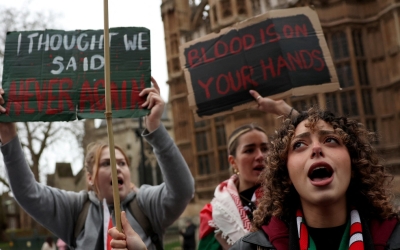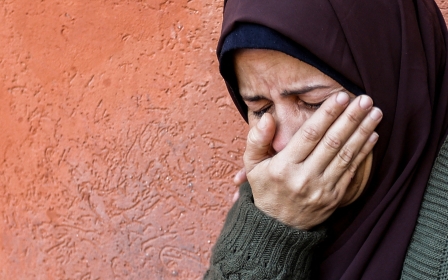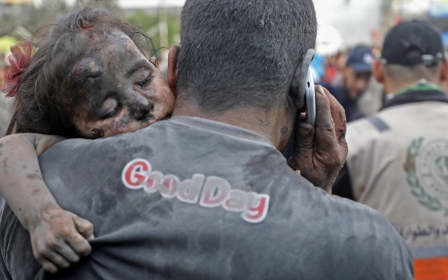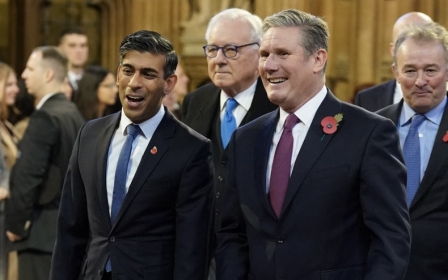War on Gaza: The loneliness of grief for Palestinians in the UK
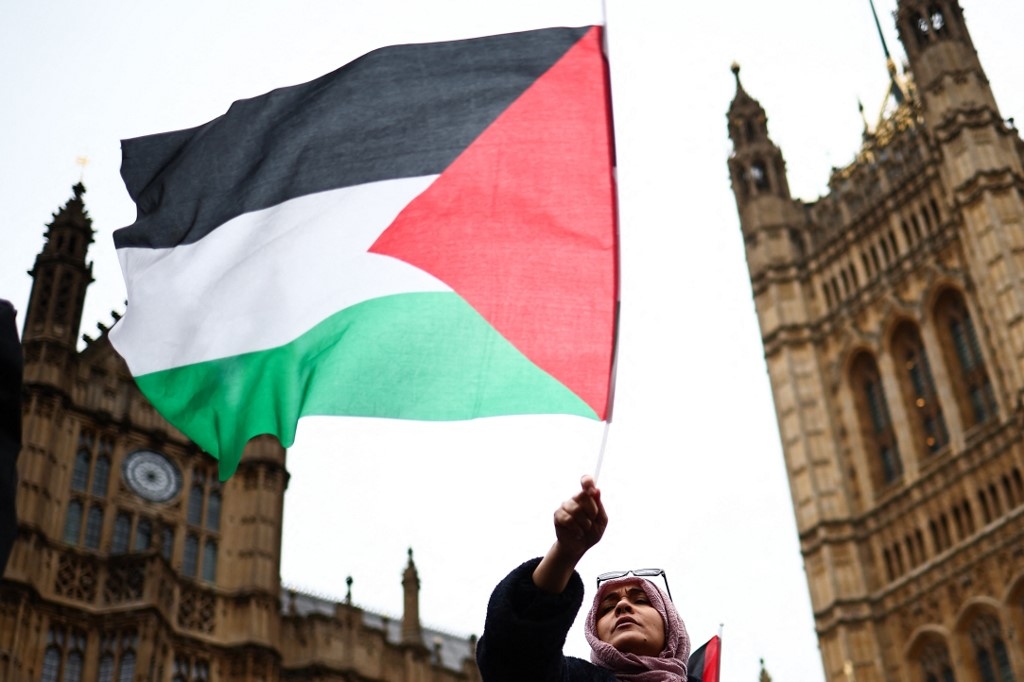
"We store our sorrows in jars, lest the soldiers see them and celebrate the siege." Mahmoud Darwish, The Butterfly’s Burden.
Trauma and grief are deeply affected by the way the wider community responds. Denial, dissociation, or victim-blaming exacerbate trauma and intensify feelings of isolation.
Helplessness, lack of agency and silencing likewise remain key, as does the question of whether victims attain justice and perpetrators are held to account.
Amid the intense and accelerating suffering endured by Palestinians in Gaza, all these factors remain crucial to prospects for recovery.
They are also relevant for the approximately 20,000 Palestinians living in the UK, many with families in Gaza. They either have suffered - or expect at any minute to suffer - unbearable loss; with as many as 40, 50 or more members of their extended families, including children and babies, killed.
New MEE newsletter: Jerusalem Dispatch
Sign up to get the latest insights and analysis on Israel-Palestine, alongside Turkey Unpacked and other MEE newsletters
Experiencing these horrors at one remove from a place of safety can bring about feelings of extreme impotence as well as guilt and shame at being safe, warm, sheltered and fed.
Helplessness includes being unable to do much beyond phoning and, if lucky, receiving the - never reassuring enough - reply: “We are alive… for now.”
Not having received the worst of news means dreading the moment when the phone’s "ping" heralds catastrophe.
Mourning for dead or missing family members is hardly even possible when in a state of such hyper-alertness about the fate of those still alive. Knowledge of the extreme privations they suffer through homelessness and accelerating levels of starvation and disease creates another level of agony, as does trying to bring family members to the UK, facing indifference and obstruction from the Home Office.
Vast, collective trauma
For those whose family members have been killed, is it even possible to measure a private bereavement against such vast, collective trauma?
Palestinians often feel bound to speak on behalf of all those murdered. “What happened to my family is what has happened to over 1,200 other families,” said Palestinian journalist Ahmed Alnaouq of the deaths of 21 members of his family in Gaza in early November.
Follow Middle East Eye's live coverage of the Israel-Palestine war
Living in a safe country, yet being emotionally present in a homeland subjected to genocidal onslaught and catastrophic destruction, is not an experience unique to Palestinians. Ukrainians hosted in the UK also have to witness helplessly as their cities are destroyed by Russian bombardment and their loved ones murdered.
But there are layers of pain for Palestinians which go well beyond these common experiences.
Alnaouq and others described how, whenever they spoke of their losses, they were asked to condemn the Hamas massacres of 7 October
They are intensified by dehumanisation, racism and manifestations of what is effectively a hierarchy of suffering.
Alnaouq and others described how, whenever they spoke of their losses, they were asked to condemn the Hamas massacres of 7 October, as if this were "the litmus test of whether Palestinians are worthy of living and grieving".
This question was shockingly asked on the BBC's Newsnight programme of Husam Zomlot, the Palestinian ambassador to London, immediately after the deaths of his own family in Gaza.
As author Judith Butler argued in Frames of War, the notion of "grievability" - which lives are considered worthy of being grieved - is deeply embedded in racist and exclusionary power structures and practices.
Criminalising of grief
Over the past six months, an avalanche of suffering has been unleashed upon the people of Gaza, following 16 years of siege, deliberate de-development and intermittent lethal bombardment.
It spreads out into the hearts and souls of all witnesses: grieving family members, healthcare professionals devastated by the pain and trauma of their colleagues in Gaza, members of the solidarity movement or ordinary citizens with no close relationship to Gaza, but shocked and stricken by what they witness.
Indeed this grief reaction is part of morality, of shared humanity.
Symbols of collective mourning intermingle with those of protest. Flags, posters, social media posts, boycotts, vigils and marches attest to both.
All these modes of expression are, however, portrayed by our governing classes, not as driven by grief or moral protest but as threats to the social order, attacks on others’ identities or wilful exacerbations of "community divisions".
This silencing and often criminalising of grief and protest inevitably creates further distress and insult, as does witnessing the UK’s key politicians and much of its media blatantly supporting their aggressors. Those whose families were killed in the days immediately following 7 October had to grieve while government buildings were lit up in the colours of the Israeli flag.
The past six months have exposed the degree of anti-Palestinian racism within UK government discourse, including the crude vilification by former Home Secretary Suella Braverman of the Gaza demonstrations as "hate marches" "polluting our streets".
Her successor, James Cleverly, said demonstrators had "made your point", adding: "The question I ask myself is: what are these protests genuinely hoping to achieve?"
As in all government rhetoric, protests are constructed as wilful and indulgent rather than as possessing utter seriousness of purpose.
Cathartic moment
The willingness to make Palestine an exception to upholding international law was revealed by government reactions to the International Court of Justice (ICJ) ruling on the plausibility of South Africa’s charge that Israel was committing genocide in Gaza.
It is hard to overstate the emotional impact on Palestinians and their allies of witnessing South Africa’s lawyers provide evidence to the court of the devastating impact of Israel’s murderous assaults on the people of Gaza.
The reality of the Palestinian experience was relayed to the world and Israel, the perpetrator, was held to account. It was a cathartic moment where a lived and known but silenced narrative was held to the light and relayed to the world.
The UK government’s response? To dismiss the ICJ’s ruling, claiming “it is not the government’s interpretation” and that “throwing accusations of genocide across the chamber in respect of Israel’s activities is extraordinarily offensive and in my view totally wrong”.
The meaning behind this statement by the Foreign, Commonwealth and Development Office minister, Andrew Mitchell, could hardly be clearer. If it upsets Israel or its supporters, the signifier - the word genocide - rather than the signified - the act itself - is what should be condemned.
Contrast this care for the hurt feelings of Israel’s supporters with the excessive monitoring for offence of Palestinians’ and their supporters’ speech and actions. This hyper-scrutiny is evident in the condemnation of placards or slogans on demonstrations, demands that flags be removed and the accusations of antisemitism that frequently accompany criticisms of Israel.
UK citizens witness on their TV screens the murdered, mutilated, shattered and starved bodies of Gazans and yet receive the message that calling for it to stop is somehow 'one-sided' or 'partisan'
By contrast, no government minister has yet publicly condemned floridly genocidal talk from Israeli politicians.
There are myriad examples of restrictions on pro-Palestinian activities, from kite-making workshops being forced to cancel, to fundraising events for doctors or lectures in cultural institutions having to relocate because of "security fears" or exaggerated concerns about "offence".
Thus the emotions inevitably accompanying unbearable loss and suffering are submitted to what we can only call a "policing of emotions", meaning that public expressions of pain are portrayed as disruptive and inimical to the public good. This has insidious effects on organisations and their willingness to tolerate those speaking out about the carnage in Gaza.
Friends and colleagues from Palestine and other Arab states describe the effect on them of this atmosphere and how it leaves them constantly on the alert for racist or orientalist tropes. Tutors on courses teaching anti-racism and de-colonisation are suddenly found to be squeamish on the question of Zionism.
Colleagues face injunctions in their workplaces not to discuss the assault on Gaza; the rationale usually being that it is "too divisive".
What does this mean? Millions of UK citizens witness on their TV screens the murdered, mutilated, shattered and starved bodies of Gazans, including over 13,000 children, and yet receive the message that calling for it to stop is somehow "one-sided" or "partisan" rather than coming from a universalist position on the sanctity of human life.
Dehumanisation
Research into media coverage exposes the way that language can diminish the enormity of the crimes against the people of Gaza. On the BBC, between 7 October and 4 November, words like “mass murder”, “brutal murder” and “merciless murder” were used 52 times by journalists to refer to the deaths of Israelis but never in relation to Palestinian deaths.
While active verbs are employed for atrocities against Israel, when it comes to Gaza, it is the passive voice. A humanitarian catastrophe is "underway" or "playing out", but apparently no one is actually perpetrating it.
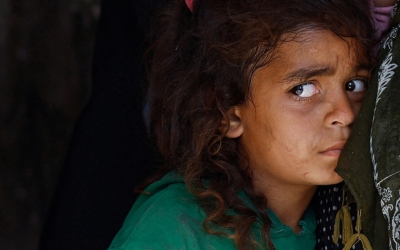
In these assemblages of dehumanisation are strong echoes of colonial processes of racism and "othering", where moral affront and protest threatening power interests have historically been labelled dangerous and dealt with repressively.
In the face of such disparities of power, it is easy to succumb to feelings of helplessness, exhaustion and despair. Grief is compounded by injustice. Injustice is exemplified in the Home Office’s refusal to allow Ukraine-style visa schemes to Palestinians, leading many, desperate to save their families, to initiate crowdfunding appeals.
Although this raises agonising dilemmas, such as facilitating displacement, most people whose families’ survival is at stake feel they have no choice.
These initiatives involve taking control and thus feeling some sense of agency when governments abjectly fail. It also has provided evidence of the groundswell of support in civil society.
As horrors continue to mount, the spirit of Palestinian sumud (steadfastness) invigorates supporters and, reciprocally, Palestinians take heart from manifestations of solidarity.
The global outpouring of outrage, which is demonstrated through marches, vigils and boycotts may, writes Pankaj Mishra, “persuade no one in the hardened western political mainstream”, but it may also “alleviate for now the Palestinian feeling of absolute loneliness”.
The views expressed in this article belong to the author and do not necessarily reflect the editorial policy of Middle East Eye.
Middle East Eye delivers independent and unrivalled coverage and analysis of the Middle East, North Africa and beyond. To learn more about republishing this content and the associated fees, please fill out this form. More about MEE can be found here.



